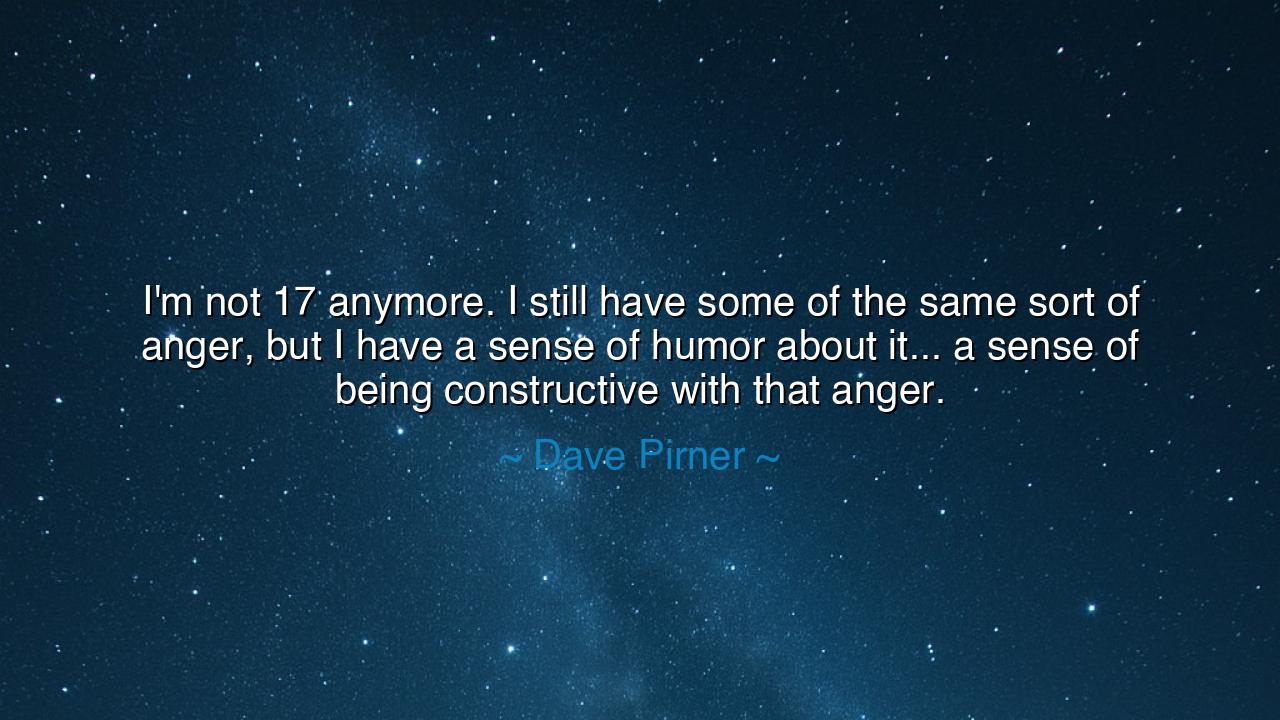
I'm not 17 anymore. I still have some of the same sort of anger
I'm not 17 anymore. I still have some of the same sort of anger, but I have a sense of humor about it... a sense of being constructive with that anger.






In the journey of life, the passage of time bestows upon us not only the wisdom of years but the strength to look at our own emotions through a lens of reflection. Dave Pirner, in his deep insight, speaks of this transformation when he says, "I'm not 17 anymore. I still have some of the same sort of anger, but I have a sense of humor about it... a sense of being constructive with that anger." In these words, Pirner touches on a timeless truth—that anger, though ever-present, can be transformed over time, from a destructive force into one that builds and teaches. This is not just a personal journey but a universal one, one that the ancients recognized as the heart of maturity and wisdom.
Consider the ancient philosophers, who spoke of anger not as an emotion to be suppressed, but as a force to be understood. Aristotle himself wrote about anger in his Rhetoric, understanding it as a natural human emotion, one that arises when we feel wronged or hurt, but must be tempered by reason and reflection. For the ancient thinkers, the key was not in denying anger, but in learning how to channel it constructively, to use it for purposeful action rather than allowing it to lead to rash and thoughtless decisions. Pirner, much like these philosophers, speaks to this very transformation—the shift from the unbridled rage of youth to a more tempered anger, one that can be directed toward positive change.
In the young heart, anger often burns hot, with little restraint, a fire that seeks to destroy as much as it seeks to express itself. But as we grow, we learn that this fire can be controlled and focused. It is the difference between the wild and the disciplined. The great warrior-king Alexander the Great, though a leader of fierce ambition and emotion, knew that his rage could not be allowed to dictate his choices. He sought to channel it toward the conquest of new lands, not into the destruction of his own people or his sense of honor. In the same way, Pirner acknowledges that his anger, still present, has been honed, shaped, and made into a force that can create rather than ruin.
Yet, as Pirner wisely notes, it is not just the understanding of anger that transforms it, but the humor that we find in it. There is profound wisdom in laughter, especially when it is directed at the irrationality of our own impulses. Humor gives us the ability to step back from our emotions and see them from a different perspective, a cleansing gift that helps us disarm the destructive potential of anger. The ancient stoics, like Epictetus and Marcus Aurelius, were masters of this practice. They taught that by approaching life's challenges and emotional turmoil with humor and perspective, one could achieve inner peace and resilience. Pirner’s statement is a modern echo of this ancient wisdom: anger can be softened and transformed into constructive energy if we laugh at its absurdity, rather than letting it consume us.
The lesson that Pirner offers is both personal and universal: the process of maturity is not about the elimination of anger, but the transformation of it. It is the understanding that we grow not by suppressing the fire within us, but by learning to direct it toward something that serves a greater good. Much like the ancient warrior-poets, whose anger at the injustices they faced led them to write epic sagas of heroism, we too must use our anger to fuel our creative and constructive efforts. In this way, anger becomes not a weapon that harms, but a tool that builds and creates.
In our own lives, then, we must take this lesson to heart. We must learn to look at our anger not as an enemy, but as a companion. It is an emotion that, if understood and channeled, can be the driving force behind our greatest works—whether they be creative, personal, or social. Like Pirner, we must accept that anger is a natural part of being human, but also recognize that it is not a force to be feared, but one to be understood, laughed at, and guided toward a purpose. When we can do this, when we can laugh at the intensity of our emotions and use them for good, we find that even our most destructive feelings can be transformed into something that elevates us and the world around us.
Thus, the wisdom of Pirner and the ancients teaches us that anger, though inevitable, does not have to dominate us. We must not deny it, but transmute it. We must embrace it with humor, with wisdom, and with the understanding that our emotions—when handled with care—can be constructive rather than destructive. Let us face the challenges of life, not with rage and frustration, but with the strength that comes from understanding and the humor that gives us the ability to transform ourselves and our world.






AAdministratorAdministrator
Welcome, honored guests. Please leave a comment, we will respond soon